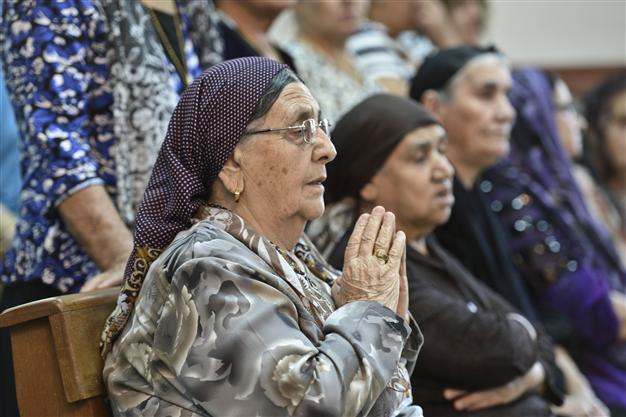No room for Christians in Iraq anymore, fleeing residents say
İpek Yezdani - ipek.yezdani@hurriyet.com.tr ARBIL

Hürriyet Photo / Selçuk Şamiloğlu
Alive but not at peace, Iraqi Christians who have fled the advance of the Islamic State of Iraq and the Levant (ISIL) in Mosul are recounting their nightmares about the group, while also lamenting the ostensible end of a place for their community in Iraq.
Thousands fled the violence after ISIL, which now calls itself the Islamic State (IS), took control of Mosul, and many others who were left behind were forced to flee the city last week under the threat of forced conversion or execution by jihadists. Not only were the Christians harried, but their heritage that is thousands of year old was destroyed while their homes and possessions were confiscated by the militants led by ISIL.
Over the last month, thousands of Christians who had enough money and passports fled abroad, mostly to Turkey, Lebanon and European countries. Thousands of others have found shelter in Christian towns and villages around Mosul, mostly in Qaraqoush, Bartillah, Baashiqa, Tilkaif, Alqoush and Ankawa, which are controlled by Kurdish Peshmarga forces.
Daily Hürriyet has conducted one-on-one interviews with Iraqi Christians in these towns and villages. The first stop was the St. Joseph Church in Ankawa, the biggest Christian neighborhood in the area, which is a 15-minute drive to the center of Arbil. Sunday mass was more crowded than on regular days, with dozens of Christians who fled from the violence in Mosul also attending the mass in the church. Almost all the worshippers attending spoke of their fear.
Enormous fear“We live under Peshmarga protection here, but we still have enormous fear. We live with this feeling all the time, all the Christians are prepared to escape at any minute, in case [ISIL] attacks again. People who can afford to travel have fled to Turkey, Lebanon, Jordan and Europe,” Rimon Halid, 23, told daily Hürriyet.
“My relatives in Mosul fled Alqoush because of ISIL. Many Christians have also fled Ankawa. The church has been trying to find apartments and homes for them, so they were settled inside the churches and schools. Many families share the same apartment with 20-30 people together,” Selma Hurmuz, 65, said.
No electricity, no waterSince ISIL has cut electricity and water to the surrounding towns of Mosul, there is no electricity and water in most of the Christian towns and villages in the area. There is also a big shortage of fuel.
Hundreds of Christian families fled from Mosul have been settled in the shanty houses which belong to the church in Bartillah. Most of them are afraid to speak. Only a couple of them could speak of the terror they experienced back in Mosul.
An old Syriac resident of Mosul, 75-year-old Chumbled Eblahad, fled the town with her three children and 16 grandchildren. “They attacked us in Mosul. We had to run away. I am old and I cannot walk fast, my children carried me by wheelchair from New Mosul to the Wahdet neighborhood. Then we escaped here. Our neighbors sent messages a couple of days later, they said jihadists were confiscating our homes. I cry every day here. Our only hope is going back to Mosul one day,” she said while crying.
The Bashir family, another Syriac family who fled from Mosul, has been staying in one room which was given to them by the church in Bartillah. “I could only take one bag of clothes with me. We left everything behind. You don’t know how I am feeling right now, my heart is burning,” said Enwar Bashir, 42, who used to work at a bank in Mosul before ISIL captured the town.
Bashir said her biggest fear is for her 5-year-old son. “How am I going to send this child to school now? What will happen to his future? We don’t even have water and electricity here. We dug a well but that water is not drinkable. We didn’t use to live like this. There is no room for us in Iraq anymore. We want to go abroad but we have neither money nor passports.”
Even the word ISIL scares us, Syriac Catholic archbishop says
Qaraqoush is the biggest Christian village in the area, located seven
kilometers from Mosul. More than 50,000 Christians have been living in
the village which is protected by the Kurdish Peshmarga forces.
“ISIL
has bombed our village for many days, everybody has left their houses.
However, they have come back after Peshmarga forces took over the
village. We still have hundreds of families fled from Mosul in the
village,” the archbishop of the Syriac Catholic Church in Qaraqoush,
Yohanna Petros Mouche, told daily Hurriyet.
Mouche said ISIL
militants had destroyed the historical Syriac monuments in Mosul. “They
have destroyed pictures and crosses that are thousands of years old in
the churches. We used to get on very well with the Muslim villages
around here before ISIL. Now even hearing the name of ISIL makes us
afraid,” Mouche said.
We want autonomous region for Christians, politician says
The situation in Iraq for Christians is worsening every day, former
lawmaker and the secretary general of the Christian Bet-Nahrain
Democratic Party, Romeo Hakari has said, calling for an autonomous
region for Christians in Iraq.
“Thousands of Christian families have
become refugees both in Iraq and abroad after ISIL took control of some
cities. Our plan for the last three years has been to have an autonomous
region for Christians in northern Iraq, following the declaration of
independence in Kurdistan. According to the draft Constitution, we have
this right,” he said.
Hakari said their biggest concern was the
potential change in Iraq’s demography if Christians continue to leave
the country. “Christians were always living under threat. In the past
wars, hundreds of thousands of Christians have left Iraq. Now there are
200,000 to 300,000 Christians left behind. If they also leave, then the
demography of this region would totally change,” he said.
